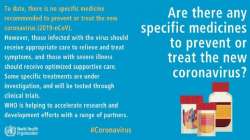Coronavirus Outbreak: What is the cure? WHO answers FAQ
China on Monday reported 361 have died on the mainland from the new virus, with an additional 2,829 new cases over the last 24 hours bringing the Chinese total to 17,205. The latest figures Monday come a day after the first death from the illness was recorded outside China, in the Philippines, as countries around the world evacuated hundreds of their citizens from the infection zone.

China on Monday reported 361 have died on the mainland from the new virus, with an additional 2,829 new cases over the last 24 hours bringing the Chinese total to 17,205. The latest figures Monday come a day after the first death from the illness was recorded outside China, in the Philippines, as countries around the world evacuated hundreds of their citizens from the infection zone.
Chinese authorities completed a new, rapidly constructed 1,000-bed hospital for victims of the outbreak and delayed the reopening of schools in the hardest-hit province. Restrictions were tightened still further in one city by allowing only one family member to venture out to buy supplies every other day.
The number of confirmed cases will keep growing because thousands of specimens from suspected cases have yet to be tested, said the WHO representative in Beijing, Gauden Galea.
Here are some questions about the spread and cure of Coronavirus answered by the World Health Organisation.
Can pets at home spread the new coronavirus?

At present, there is no evidence that companion animals/pets such as dogs or cats can be infected with the new coronavirus. However, it is always a good idea to wash your hands with soap and water after contact with pets. This protects you against various common bacteria such as E.coli and Salmonella that can pass between pets and humans.
Does the new coronavirus affect older people, or are younger people also susceptible?
People of all ages can be infected by the new coronavirus (2019-nCoV). Older people, and people with pre-existing medical conditions (such as asthma, diabetes, heart disease) appear to be more vulnerable to becoming severely ill with the virus.
WHO advises people of all ages to take steps to protect themselves from the virus, for example by following good hand hygiene and good respiratory hygiene.
Are antibiotics effective in preventing and treating the new coronavirus?
No, antibiotics do not work against viruses, only bacteria.
The new coronavirus (2019-nCoV) is a virus and, therefore, antibiotics should not be used as a means of prevention or treatment.
However, if you are hospitalized for the 2019-nCoV, you may receive antibiotics because bacterial co-infection is possible.
Are there any specific medicines to prevent or treat the new coronavirus?
To date, there is no specific medicine recommended to prevent or treat the new coronavirus (2019-nCoV).
However, those infected with the virus should receive appropriate care to relieve and treat symptoms, and those with severe illness should receive optimized supportive care. Some specific treatments are under investigation and will be tested through clinical trials. WHO is helping to accelerate research and development efforts with a range or partners.
Also Read | Figures: 361 deaths, 17,205 infected; 2019-nCoV epidemic is on the rise

